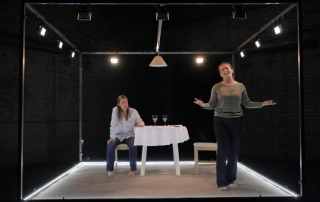On 6th December 2019, NU Women participated in a campaign to show a recorded performance of Open Clasp’s gut-wrenching and game-changing production, Rattle Snake, to as many people as possible. Why? Because despite living in a country where discussions about domestic and sexual violence are happening more frequently, over one million women still experience some form of domestic or sexual violence per year – and these are only the figures we know about.
Open Clasp is a charitable organisation placing theatre at the heart of transforming lives of disadvantaged women and girls through acts of collaboration. They campaign for change on an international, national, and personal level. They’ve won awards for their work, but most importantly they’ve reached out to and impacted the lives of 107,764 people to date.
They’re incredible.
From 25th November – 10th December 2019, Open Clasp made their live recording of Rattle Snake available online to demonstrate the signs, effects, and emotional upheaval caused by coercive control in personal relationships.

They bring to the stage the reality of women experiencing the often-hidden nature of domestic abuse through the emotive and powerful performance of two actors. In fact, I couldn’t believe there were only two women on stage – the emotion they put into showing the multifaceted reality of the women they represented was breath-taking. And when I say reality, I mean these are performances based on collaboration with women who have experienced the trauma of coercive control. Trauma that won’t end unless we, as a society, are willing to look for the signs of such abuse and have a system that puts an immediate stop to it.
The need to recognise these signs was further emphasised by Catrina McHugh, the Artistic Director of Open Clasp and playwright of Rattle Snake, as she discussed why she made the performance available for all – because there’s a need for further empathy about such situations as a society and within the judicial system. What really impressed me about the evening was the supportive and welcoming environment it invited in discussing the issues raised in the performance – it was inspiring to hear everyone’s response and engage with the production directly.
Numerous letters and feedback by those who have been impacted by the performance are posted on Open Clasp’s website, showing just how important a role this performance plays in initiating discussion about coercive control. Not only that, but the play has been used in police training to make officers aware of, and recognise, the signs of domestic abuse, as well as to understand that you need to know the full story before judgement can be passed.
Before we expect the situation around domestic abuse to change, we need to be willing to talk about it, and Open Clasp runs ahead of the crowd in working within communities to represent real experience and put it out there to campaign for change.




